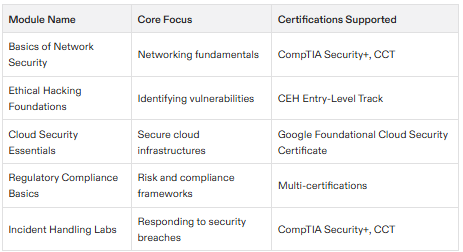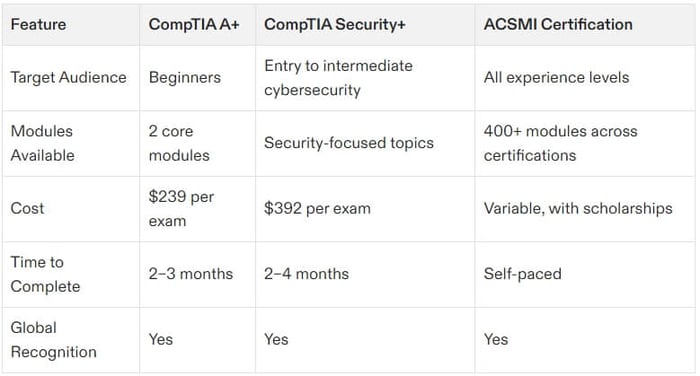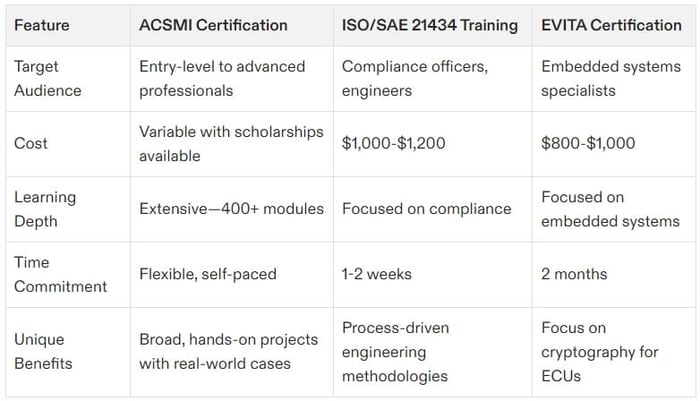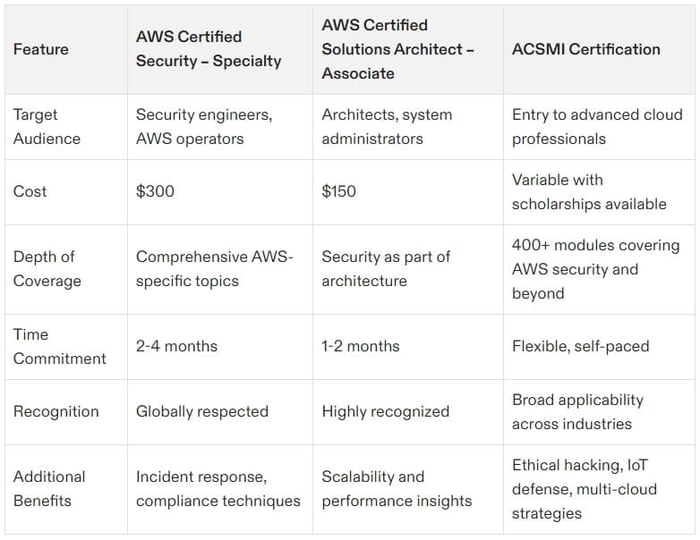Table of Contents
- What is a Cybersecurity Certification Entry Level Program?
- Why Cybersecurity Certification Entry Level Programs Matter
- How to Prepare for Cybersecurity Certification Entry Level
- Role of ACSMI in Cybersecurity Certification Entry Level Prep
- ACSMI Certification Modules
- FAQ Section
- 1. What is the easiest Cybersecurity Certification Entry Level to start with?
- 2. How long does it take to achieve an entry-level cybersecurity certification?
- 3. Do I need technical experience before attempting certifications?
- 4. Are online certifications valued by employers?
- 5. What career roles can I target with entry-level certifications?
- Final Thoughts
Breaking into the fast-growing field of cybersecurity starts with the right certifications. But as a beginner, navigating your options and knowing where to start can feel like a daunting task. That’s where Cybersecurity Certification Entry Level programs come in. These certifications build foundational knowledge, offering a significant first step toward a career in safeguarding digital environments.
What is a Cybersecurity Certification Entry Level Program?
A Cybersecurity Certification Entry Level program is designed to help beginners build a strong knowledge base in areas like networking, security policies, ethical hacking, and incident response.
Unlike advanced certifications, entry-level credentials don’t require years of experience. They’re an excellent gateway for those new to the field, providing foundational expertise to secure roles like security analyst, junior SOC (Security Operations Center) operator, or IT security specialist.
Popular Entry-Level Certifications
CompTIA Security+
- Focuses on basics like risk management, cryptography, and access control. Recognized globally, it’s a great first step for anyone entering cybersecurity.
Certified Cybersecurity Technician (CCT)
- Covers fundamental skills like configuring defense systems and cybersecurity protocols. Ideal for aspiring technicians.
Certified Ethical Hacker (CEH) – Entry Level Track
- Teaches basic ethical hacking techniques and tools to identify and prevent vulnerabilities.
Google Cybersecurity Certificate (Foundational Track)
- Designed for cloud beginners to understand the critical aspects of securing data and applications in Google Cloud environments.
Each program paves the way to higher-level certifications like CISSP or CISM, making it easier to grow in the field gradually.
Why Cybersecurity Certification Entry Level Programs Matter
1. Establishing Foundational Knowledge
Every cybersecurity professional needs a strong foundation in networking, systems management, and incident handling. Entry-level certifications focus on these basics, ensuring you’re ready to take on higher-level challenges.
2. Gaining Credibility Without Experience
Breaking into cybersecurity with no prior work history is tough. Credentials like Cybersecurity Certification Entry Level act as your proof of competency in the job market.
3. Setting the Stage for Long-Term Growth
These certifications aren’t just about landing a job—they also provide the basis for pursuing specialized roles in cloud security, penetration testing, and compliance.
4. Expanding Career Opportunities
From government agencies to private tech firms, certified professionals are in demand. Certifications open doors to multiple sectors and increase your earning potential.
How to Prepare for Cybersecurity Certification Entry Level
The road to earning certifications may seem steep, but with the right strategy, you can conquer it. Here are some actionable steps to get you started.
1. Choose Your Certification
Research the curriculum and requirements of various certifications to determine which aligns best with your career goals. For example, if you’re interested in general IT security, CompTIA Security+ is a good choice, while Google’s foundational certificate is great for cloud security beginners.
2. Utilize Online Training Platforms
Platforms like ACSMI offer tailored learning modules featuring hands-on labs and video tutorials. These tools allow you to practice real-world scenarios while reinforcing your theoretical understanding.
3. Focus on Hands-On Learning
Theory is crucial, but being able to apply it is what sets you apart. ACSMI’s simulation labs replicate challenges you’ll face in certification exams and on the job, from responding to security breaches to configuring firewalls.
4. Join Cybersecurity Communities
Engaging with forums, social media groups, and platforms like Quora helps you learn from others’ experiences with Cybersecurity Certification Entry Level exams.
5. Take Practice Tests and Mock Exams
Testing your knowledge under timed conditions is an excellent way to evaluate your readiness. Many certifications provide sample questions, but ACSMI can give you a more immersive test-prep experience.
Role of ACSMI in Cybersecurity Certification Entry Level Prep
Preparing for an entry-level cybersecurity certification can feel overwhelming, but ACSMI turns challenges into opportunities. The platform provides an all-in-one solution to hone your skills, deepen your knowledge, and boost your confidence to tackle even the most demanding certifications. Here’s why ACSMI is an essential partner in your certification prep.
1. Extensive Module Coverage for Foundational Mastery
ACSMI offers a massive library of over 400+ modules that align directly with the core topics of entry-level certifications. From basic network security to ethical hacking fundamentals, every subject is covered in depth and structured to support gradual, comprehensive learning.
- Why This Matters: Certifications like CompTIA Security+ or Google’s Foundational Cloud Security Certificate test a variety of domains. With ACSMI’s vast curriculum, you’ll master all areas and be thoroughly prepared to handle any question.
2. Hands-On, Simulation-Based Learning
ACSMI’s standout feature is the hands-on practice it provides through interactive labs. These simulations mirror real-world challenges, offering practical experience in areas like configuring network firewalls, responding to security incidents, and managing basic compliance tasks.
- Why This Matters: Practical skills are critical for certification exams and job roles alike. ACSMI bridges the gap between theory and application, ensuring you’re equipped to solve real-life cybersecurity problems with confidence.
3. Self-Paced Flexibility for Consistent Progress
Whether you’re balancing your studies with work, school, or family obligations, ACSMI’s self-paced learning approach adapts to your schedule. You can dive into modules at your convenience, accelerate your progress, or take your time to fully understand challenging concepts.
- Why This Matters: Entry-level certifications demand consistent preparation, and ACSMI’s flexible design ensures you don’t sacrifice quality learning due to time constraints.
4. Practical Benefits for Real-World Application
ACSMI isn’t just about passing certifications—it’s about building a solid foundation for your cybersecurity career. The skills you gain from ACSMI’s labs and modules are directly applicable to real-world scenarios, helping you transition into roles like Security Analyst or SOC Operator with ease.
- Why This Matters: Employers value candidates who can go beyond book knowledge. ACSMI prepares you for day-one readiness in any cybersecurity role, setting you apart in the competitive job market.
ACSMI Certification Modules
FAQ Section
1. What is the easiest Cybersecurity Certification Entry Level to start with?
CompTIA Security+ is widely considered accessible for beginners as it covers fundamental cybersecurity concepts without requiring prior expertise.
2. How long does it take to achieve an entry-level cybersecurity certification?
On average, preparation can take between 3-6 months, depending on your chosen certification and the time you can dedicate weekly. Self-paced platforms like ACSMI can help you accelerate this timeline.
3. Do I need technical experience before attempting certifications?
No, most entry-level certifications like Security+ are designed for those without a technical background, providing all the foundational knowledge you need.
4. Are online certifications valued by employers?
Yes, certifications like Security+ or Google’s foundational cybersecurity program hold significant weight in the tech industry, especially when coupled with practical training from platforms such as ACSMI.
5. What career roles can I target with entry-level certifications?
Common roles include Junior Security Analyst, IT Security Specialist, SOC Operator, and Penetration Testing Associate.
Final Thoughts
Starting your cybersecurity career becomes much easier when you focus on Cybersecurity Certification Entry Level programs. These credentials set the stage for high-paying, in-demand roles through fundamental knowledge and real-world skills. By leveraging tools like ACSMI, you can transform your learning experience with cutting-edge resources and flexible study options.
The opportunities in cybersecurity are endless, and entry-level certifications provide the stepping stones you need to unlock success in this field. Invest in your future and start building your expertise today!





